Your blood can reveal a lot about what’s happening inside your body, and there are several parameters which help detect the same. One such commonly used indicator is the ESR or Erythrocyte Sedimentation Rate, which helps assess the presence of inflammation or infection in the body. ESR measures how quickly your red blood cells (erythrocytes) settle at the bottom of a test tube. When there is inflammation in the body, the red blood cells tend to clump with each other and settle more quickly, resulting in a higher ESR value.
In this blog, let’s explore the causes of high ESR, what does high ESR indicates, how it’s diagnosed, and how to reduce ESR. But before that, let’s understand what ESR is, what the normal range looks like, and which values are considered abnormal.
ESR is a measure of how quickly your red blood cells settle to the bottom of a test tube, which is related to the presence of inflammation in your body. Inflammation is how your body reacts to injury, infection, or other health issues like immune disorders, certain cancers, or blood problems.
Normally, red blood cells fall slowly, but when there’s inflammation, they stick together. These clusters are heavier, so they settle more quickly. The speed at which they fall helps doctors assess the level of inflammation. The faster the cells settle, the more inflammation is likely present. However, the ESR values do not reveal the exact cause of the inflammation2.
ESR values along with a detailed history, physical examination and other investigations can help diagnose and monitor conditions that cause inflammation such as infections or autoimmune conditions. It can also help doctors track how well treatment is working2.
ESR is recorded in millimeters per hour (mm/hr). Its normal values are:
Please note the normal values can differ based on factors like age, sex, overall health, and even the lab conducting the test3.
Your ESR value gives information about the inflammation in your body. However, a value outside the typical range doesn’t always mean something is wrong. It’s best to talk to your doctor to understand what your results mean for you.
A high ESR may point to several underlying conditions. It can be associated with infections, such as osteomyelitis (bone infection) or septic arthritis (joint infection), autoimmune conditions like rheumatoid arthritis, or Inflammatory disorders, such as systemic lupus erythematosus (SLE) and inflammatory bowel disease (IBD). It may also be elevated during flares or relapses of chronic inflammation4, and specific conditions like pregnancy, diabetes mellitus, end-stage kidney disease, heart disease, and certain cancers3.
However, a high ESR is not always due to inflammation. Certain non-inflammatory conditions can also affect it. For example, anaemia (low red blood cell count) makes RBCs clump more easily, which increases ESR4.
While ESR is a helpful clue, it’s a non-specific test, meaning it doesn’t pinpoint the exact cause. Your doctor will consider it along with other tests and symptoms to understand what’s going on in your body.
If your ESR is higher than normal, your body might be telling you something. Below are some common signs and symptoms that may be present along with a raised ESR:
While the symptoms associated with high ESR may seem non-specific at first, it is always advisable to seek medical help when you experience the earliest symptoms to diagnose your condition.
ESR can be influenced by a variety of factors. For instance, women generally have slightly higher ESR values compared to men, and factors like aging and pregnancy can also contribute to an increase. However, certain medical conditions may also cause ESR levels to rise due to increased inflammation in the body. These illnesses may include3:
While an elevated ESR can indicate the presence of underlying conditions, it is not a definitive diagnosis on its own. It is important to look at your full health picture, such as symptoms, history, and other tests to identify the cause of the inflammation.
If you’re wondering what happens if erythrocyte sedimentation rate is high for long, note that it means there is active inflammation in your body, especially when the underlying cause is undiagnosed and untreated. This can indicate an increased risk of certain medical conditions or higher chances of complications from persistent infections and inflammatory conditions, also possibly having a poorer prognosis (treatment outcome) in some cases. Let’s have a detailed look at these.
It is important to receive timely high ESR treatment to manage the underlying causes and reduce the risks associated with high ESR.
Adopting lifestyle changes to reduce high ESR is advisable as these are beneficial practices with no harm that is preferable to incorporate even if the ESR is normal. But if you are considering any kind of supplementation to reduce high ESR or prevent rise of ESR like vitamin D or omega-3-fatty acid supplements and OTC anti-inflammatory drugs, don’t do so without the advice of your registered medical doctor.
Dr. Nayana Shetty, MBBS, MD
To measure the sedimentation rate of red blood cells, an ESR test is done. This test makes use of a small sample of your blood which is placed in a test tube and watched for the settling of your red blood cells. There are several methods to perform the ESR test:
While the ESR test helps doctors check if there is inflammation in the body, it doesn’t point to any specific condition. When checking your ESR results, do remember the following:
Doctors always look at your ESR result along with your symptoms, physical examination results and other test findings. This helps them decide the right next steps for your care.
Also Read: High Platelet Count: Causes, Symptoms, Management and More!
If your ESR levels are high, it is important to identify the cause, which could be related to infection, autoimmune disorders, or other medical conditions. If you are wondering how to reduce ESR, here are some tips that can help reduce ESR levels:
It’s important to talk to your doctor before making lifestyle changes to understand how to reduce high ESR and inflammation in your body.
Consuming foods high in antioxidants can help fight inflammation over time. This may be helpful in reducing markers of inflammation like ESR. Few such anti-inflammatory foods are yogurt, avocado, berries, broccoli, chia seeds, etc24.
Dr. Nayana Shetty, MBBS, MD
High ESR is an indicator of underlying inflammation in the body. It is linked to conditions like infections, autoimmune diseases, and certain cancers. While ESR is a non-specific tool that cannot be used for diagnosis on its own, it helps doctors detect inflammatory and certain non-inflammatory conditions in the body, as well as monitor the response to ongoing treatments. You can manage your ESR levels through a healthy diet, regular exercise, and lifestyle changes such as quitting smoking and limiting alcohol intake. But remember, if your results show abnormal levels of ESR, it is important to contact your doctor for a proper diagnosis and management plan.
Also Read: Can You Check Thyroid at Home
Just like ESR, C-reactive protein (CRP) is a test that shows there might be inflammation in the body4.
No. ESR is a non-specific test. This means it must be interpreted along with clinical symptoms and other diagnostic tests to know the actual cause of symptoms. CRP is more sensitive and specific for detecting acute inflammation compared to ESR1.
Yes. Anti-inflammatory medications like NSAIDs22 or corticosteroids23 may lower ESR values, even if inflammation is present in the body, and other medications like biologics or immunosuppressants can elevate it. You must always take medication for managing your ESR as prescribed by your doctor. Never self-medicate.
Low ESR levels can happen in conditions where there are too many red blood cells (like polycythaemia) and in blood disorders like sickle cell anaemia3.
Yes, ESR can be elevated in healthy individuals during pregnancy, aging, periods, or even due to lab errors3.
24. Yu X, Pu H, Voss M. Overview of anti-inflammatory diets and their promising effects on non-communicable diseases. Br J Nutr. 2024 Oct 14;132(7):898-918. doi: 10.1017/S0007114524001405. Epub 2024 Oct 16. PMID: 39411832; PMCID: PMC11576095. Available from: https://pmc.ncbi.nlm.nih.gov/articles/PMC11576095/
Disclaimer: The information provided here is for educational/awareness purposes only and is not intended to be a substitute for medical treatment by a healthcare professional and should not be relied upon to diagnose or treat any medical condition. The reader should consult a registered medical practitioner to determine the appropriateness of the information and before consuming any medication. PharmEasy does not provide any guarantee or warranty (express or implied) regarding the accuracy, adequacy, completeness, legality, reliability or usefulness of the information; and disclaims any liability arising thereof.
Penis size is a common concern for many men, but it’s important to understand that size does not necessarily correlate with sexual satisfaction or performance[3]. While there are no exercises that can significantly increase the size of the penis, some practices can improve blood flow and contribute to better sexual health. It’s essential to approach any claims of penis enlargement with caution, as many are not supported by scientific evidence. Prioritizing general sexual health and fitness is the most reliable way to support sexual function.
What is the average penis size? How to get a bigger penis? If you are trying to find answers for these frequently searched questions- this article can help you with medically correct information.
You need some privacy, a clean ruler, a clean measuring tape or a non-stretchable string (for measuring the girth of penis).

Penis stretching exercises have gained popularity over the years. People often search online- how to increase penis size? and start following the remedies and exercises given on the internet. But do not set your expectations high if you are planning to try exercises to make your penis big. Let’s read more about different exercises known to increase penis size and understand the scientific logic behind them-
In this type of manual exercise, a safe lubricant is applied to the penis and massaged gently. This exercise is intended to stretch the skin of your penis which may aid in the enlargement of the penis.
Caution: Vigorous massaging can lead to tissue injury.
This stretching device can be attached to the penis and it tends to create immediate erection. The device creates a vacuum and increases the blood flow to penis with the help of suction[2],[8].
Steps:
Caution: There are limited studies around the long-term effectiveness of such devices. Always consult your doctor before using any such device around your sensitive areas.
This is the most common form of exercise among men. It may help in improving the blood circulation to penis[1].
Steps:
There is no scientific evidence that stretching exercises can increase penis size. This exercise is similar to milking a cow. This is a kind of jelqing exercise, but it uses only your thumb and index finger.
Steps:
Kegel exercises help strengthen the pelvic floor muscles and may support performance. Stay focused throughout the exercise[9].
How To Do?
Note: Before implementing any exercise or technique mentioned in this article, it is important to consult a urologist to understand the pros and cons of performing any exercise for penis. Incorrect practices may injure the penis.
Penoscortal rings are devices that may help in keeping an erection for a longer period and create the appearance of a larger penis. These rings fit around the base of the scrotum and penis, helping to keep the blood in the penis, which might make make it look bigger during sexual activities. However, it should be worn cautiously and after consulting a doctor, as it may also cause discomfort and injury.
Dr. Nayana Shetty, MBBS, MD
While many products and techniques claim to increase penis size, there is little scientific evidence supporting their effectiveness. However, maintaining a healthy lifestyle can contribute to better overall sexual health, which might indirectly influence penis function and appearance.

A balanced diet rich in macro and micro nutrients, such as fresh fruits, vegetables, whole grains, lean proteins, and healthy fats, is essential for overall health, including sexual health[10]. Proper nutrition supports blood flow and hormone levels, which are crucial for sexual function.

Regular physical activity improves cardiovascular health, which is vital for maintaining proper blood flow. Exercises like Kegels specifically target the pelvic floor muscles, potentially improving sexual performance and penile function.

Maintaining a healthy weight can prevent conditions like obesity and diabetes, which are known to negatively impact sexual health. Excessive body fat can also reduce testosterone levels, leading to potential issues with libido and erectile function[11].

Adequate sleep is crucial for hormonal balance, including testosterone production. Poor sleep can lead to lower energy levels and reduced sexual desire, affecting overall sexual health.

Chronic stress can lead to hormonal imbalances, including reduced testosterone levels, which may impact sexual function. Techniques such as meditation, deep breathing, and yoga can help manage stress, promoting better overall and sexual health[12].

Smoking[13] and excessive alcohol intake can impair blood flow and lead to erectile dysfunction. Quitting smoking and moderating alcohol consumption are important steps in maintaining sexual health and overall well-being.
Various products are marketed as remedies for increasing penis size naturally. These can be dangerous to your health. Never consume or use anything for penis enlargement without consulting a doctor. Here are some popular examples that you need to be cautious about-
People often ask if Penis enlargement pills increase penis size? Often marketed as natural supplements, these pills claim to increase penis size by boosting blood flow or enhancing hormone levels. However, there is little scientific evidence to support their effectiveness, and some may contain harmful or unregulated ingredients.
These topical products claim to enlarge the penis by improving circulation or stimulating tissue growth. However, there is no reliable proof that they work, and they can sometimes cause skin irritation or serious allergic reactions.
Vacuum pumps create temporary swelling by drawing blood into the penis, which can make it appear larger temporarily. While they can help temporarily with erectile dysfunction, they do not result in permanent size increase and overuse can lead to tissue damage.
Also Read: Does Masturbating Increase Risk of Prostate Cancer or Vice Versa?
Penis-enlargement surgery (phalloplasty)[2] is rarely needed and is usually reserved for cases where the penis doesn’t function properly due to a congenital issue or injury. Some surgeons offer cosmetic procedures to enlarge the penis, but these are controversial and often deemed unnecessary by experts. There is a lack of sufficient research to fully understand the risks and benefits of these procedures.
A penis enlargement surgery can be involve any one of the following :
To know more about the risks and benefits associated with surgery to increase penis size, consult a urologist and plastic surgeon.
Many people are not aware that filler injections might also help in increasing penis size. Studies have shown that using these fillers may lead to a modest increase in some, especially in the initial months. These injections may also improve erectile dysfunction in the long run. However, more studies are needed to validate these treatments for their effectiveness and safety.
Dr. Nayana Shetty, MBBS, MD
Consult a psychiatrist and a urologist first. Many-a-times it’s not the size but the self doubt related to the normal size of penis that creates the entire problem. Consulting an expert can solve the problem. They may help you in understanding the following-
Also Read: Things You Shouldn’t Do Before And After Sex
Worrying about penis size is common, but it’s crucial to remember that size doesn’t determine masculinity or sexual ability. Confidence in and acceptance of your natural size is key to a fulfilling and healthy sexual life. If you are constantly looking for options to increase penis size, if concerns about penis size are affecting your mental health or relationships, consulting a sexologist (MBBS, MD Psychiatry) can help address these issues and provide guidance on managing anxiety and self-esteem.
Also Read: Is Daily Sex Good for Health?
Your penis stops growing once you finish your puberty phase. However, it may vary from person to person. Usually, by the time you are 16 years old, your body and its parts should be close to your adult size.
You can have foods such as spinach, apples, avocados, carrots, oats and tomatoes, nuts and seeds along with a balanced diet. Good nutrition is known to support overall sexual wellness.
A penis enlargement surgery may add half an inch to the penis but does not change the actual length of the penis. Surgery can result in complications such as infection, scarring, and loss of sensation or function. A plastic surgeon can help you understand the risks vs benefits of undergoing a penis enlargement surgery after assessing your health.
No, height does not have a direct impact on penis size. Penis size is primarily determined by genetic and hormonal factors during fetal development and puberty, while height is influenced by different genetic and environmental factors. The growth of the penis is mainly governed by hormones like testosterone, whereas height is influenced by hormones like growth hormone and IGF-1. Therefore, variations in height do not correlate with variations in penis size, and each individual’s body proportions are unique and unrelated to one another.
Penis size alone does not determine sexual performance. Sexual satisfaction involves various factors, including emotional connection, communication, technique, and understanding a partner’s needs and desires.
Some individuals may experience performance anxiety or low self-esteem related to their perceived penis size. These concerns can affect sexual confidence and satisfaction. Open communication with a partner and seeking professional support, such as counselling or therapy, can be helpful.
Penis size generally does not affect fertility or sexual health. Fertility is determined by factors such as sperm quality and reproductive health. Sexual health is influenced by overall well-being, emotional connection, and practising safe and consensual sexual behaviours.
The size of the penis generally remains stable throughout adulthood. However, with age, men may experience a decrease in testosterone levels, which can lead to reduced sexual desire and erectile function. These changes are typically unrelated to actual penis size.
Losing weight may not directly increase penis size, but it can affect the visibility of the penis. As excess weight is lost, the pubic fat pad may become less prominent, making the penis appear more visible and potentially giving the illusion of increased size.
Yes, penis size has a genetic component, with factors such as genetics and hormonal influences playing a role in determining an individual’s natural size. However, environmental factors and overall health can also influence development.
There is no scientific evidence to suggest that creatine supplementation has any impact on penis size. Penis size is primarily determined by genetic and hormonal factors, while creatine is commonly used to enhance athletic performance and muscle strength.
There is no scientific evidence to support the idea that apple juice can influence penis size. Penis size is primarily determined by genetic and hormonal factors, and no specific food or drink has been proven to affect its growth.
Penis size is primarily determined by genetic factors, including the influence of hormones during fetal development. While genetics play a crucial role, environmental factors and overall health can also contribute to individual variations in penis size.
To measure penis size accurately, use a ruler or measuring tape to measure from the base to the tip along the top side. Ensure the measurement is taken when the penis is fully erect for more reliable results.
While testosterone plays a crucial role in sexual development, its impact on penis size during adulthood is limited. The growth of the penis primarily occurs during puberty, and testosterone influences overall sexual function rather than significant changes in size.
Penis pumps temporarily increase blood flow to the genital area, causing a temporary and modest size increase. However, the effects are not permanent, and the size change is typically temporary, diminishing after disuse.
Achieving a larger penis size is challenging and often involves accepting one’s natural dimensions. Be cautious of products or methods claiming rapid results, as many lack scientific support. If concerned, consult a healthcare professional for advice on safe and evidence-based approaches.
Disclaimer: The information provided here is for educational/awareness purposes only and is not intended to be a substitute for medical treatment by a healthcare professional and should not be relied upon to diagnose or treat any medical condition. The reader should consult a registered medical practitioner to determine the appropriateness of the information and before consuming any medication. PharmEasy does not provide any guarantee or warranty (express or implied) regarding the accuracy, adequacy, completeness, legality, reliability or usefulness of the information; and disclaims any liability arising thereof.
Platelets are small, colourless cells fragments in your blood1. They play a crucial role in blood clot formation and repairing wounds2. They are created in the bone marrow and then enter the bloodstream3. The mean platelet volume (MPV) blood test can help monitor platelets levels.
In this article, we’ll explore the world of MPV blood tests. We’ll learn what MPV is, how to get ready for the test, analyse the results, and see what happens when the levels are not right. Lastly, we will answer some questions associated with this topic.
In this section, we will try to understand MPV and its role in maintaining our health.
The MPV test is a laboratory test that measures the average size of platelets in your blood. This helps check how well the platelets are working in your body. It also helps in identifying conditions related to bone marrow and bleeding4.
An MPV test is important as it can:
Did you know?
The procedure involved in conducting the MPV test is quite simple, as stated below.
For an MPV blood test, you don’t need to prepare anything special. Have a discussion with your doctor in case they advise any other test along with MPV that might require any special preparation like fasting4. Also, you need to disclose your current health conditions, habits, and any medications that you may be currently on, as they may influence the results of the test6.
Your MPV blood test results can show high or low MPV. The causes and possible issues due to abnormal MPV are discussed below.
If your MPV result shows higher than the normal range (more than 12 fl), it might be due to the following.
A low MPV indicates that your platelets are mostly old or small in size. This is because the production of new platelets in your bone marrow has slowed down4. Some common causes of low MPV are as follows.
High MPV can occur when the body produces or destroys platelets more than usual15. This may increase the risk of blood clots16. Conversely, a low MPV can be linked to a higher chance of bleeding due to fewer platelets being produced17.
However, MPV levels alone cannot confirm a diagnosis. Your healthcare provider will consider the results of your other tests results and your health history, to find the cause of the abnormal MPV levels.
Certain studies19 indicate that MPV may be higher in COVID-19-positive people than in COVID-19-negative people. However, more research is needed to completely understand the association between the results of an MPV blood test and the severity of COVID-19 infection.
Dr. Siddharth Gupta, B.A.M.S, M.D
Thrombocytopenia is a low platelet count4.
Thrombocytopenia occurs when your blood has fewer platelets than normal. Since platelets help in clotting, a low count of platelets can cause excess bleeding17.
To find out if you have thrombocytopenia, doctors conduct a complete blood count (CBC) test with clotting test, platelet count, and MPV. If needed, a bone marrow biopsy or aspiration (taking a small sample from your bone marrow) may also be included18.
The management for thrombocytopenia depends on how severe it is and its causes. If needed, doctors may advise platelet transfusion to stop or avoid the bleeding18.
Research19 has indicated that stress, both emotional and physical, might have an impact on platelet count. Heavy exercise for an extended period of time can raise MPV. Higher-than-normal MPV is possible in people with panic disorders.
Dr. Rajeev Singh, BAMS
At your appointment, your healthcare provider will go over your past health, current symptoms, and test results. They may order more testing if needed. You should be ready to discuss any concerns, answer questions about your lifestyle, medicines you are currently taking, and your family medical history.
It’s a good plan to prepare a list of questions for your healthcare provider. These could include the following.
Getting to know your MPV blood test results is key for maintaining health. This article gives a complete and easy-to-understand guide to help you understand the MPV test, its importance, and what it means when results are not normal.
While a low or high MPV can indicate health issues, it’s always important to consult with a healthcare expert to help put the results in context and order more tests if needed.
If your MPV is high, it suggests that your platelets are larger than normal. This might be due to many reasons such as cancer, recovering from injuries, heart disease, and more. Your healthcare provider will consider all factors to find out the cause of high MPV level.
A low MPV indicates that most of your platelets are old and the production of new platelets in your bone marrow has reduced. The reason for this could be bone marrow failure, lupus, chemotherapy, hypothyroidism, iron-deficiency anaemia, or HIV/AIDS among others.
For women, usual MPV levels are between 8-12 fl. However, you should always consult a healthcare expert to correctly understand your MPV result and what it means for your health.
Some cancers that affect the bone marrow, such as leukaemia or lymphoma, might cause low MPV. They disrupt the normal process of producing platelets. Remember, only measuring MPV cannot diagnose the cancer. An in-depth examination by a healthcare expert is needed.
An MPV of 9.3 is generally within the normal range. However, the interpretation of blood test results can vary depending on the reference range provided by the laboratory and the individual’s medical history. It’s advisable to consult a healthcare professional for a comprehensive evaluation of blood test results.
Disclaimer: The information provided here is for educational/awareness purposes only and is not intended to be a substitute for medical treatment by a healthcare professional and should not be relied upon to diagnose or treat any medical condition. The reader should consult a registered medical practitioner to determine the appropriateness of the information and before consuming any medication. PharmEasy does not provide any guarantee or warranty (express or implied) regarding the accuracy, adequacy, completeness, legality, reliability or usefulness of the information; and disclaims any liability arising thereof.
Links and product recommendations in the information provided here are advertisements of third-party products available on the website. PharmEasy does not make any representation on the accuracy or suitability of such products/services. Advertisements do not influence the editorial decisions or content. The information in this blog is subject to change without notice. The authors and administrators reserve the right to modify, add, or remove content without notification. It is your responsibility to review this disclaimer regularly for any changes.
The PDW blood test is a medical test that checks for size differences in blood platelets. The main function of platelets includes clotting and ensuring smooth blood flow in the body3.
In this article, we will cover the basics of a PDW blood test. We’ll discuss why it’s done, how it’s done, and what the results mean. We will also touch on the connection between PDW and blood disorders tied to platelets. Lastly, we’ll share ways to get ready for a doctor’s visit for a PDW test.
The role of a PDW (platelet distribution width) blood test is to assess how well a person’s platelets are working whose main function is to create clots and aid in wound repair and stop blood loss3.
PDW test measures the size differences in platelets in a person’s blood. High PDW means that there is a range of platelet sizes, and low PDW suggests more similar sized platelets3. Knowing these variations helps doctors understand how a person’s platelets are functioning.
The purpose of doing a PDW blood test is as follows.
A PDW blood test needs a blood sample from a vein in your arm or hand. Below we have described how to get ready for the test and what happens during the process.
Typically, no unique preparations are needed for a PDW blood test. But if you’re also doing other tests on the same day, your healthcare provider may suggest some things. Always let your provider know about any drugs, vitamins, supplements, or herbal products you’re taking. This avoids an unexpected impact on test results.
During the test, a medic places a small needle into a vein in your arm or hand to take blood. Once they get the sample, it’s sent to a laboratory for study. Though the test is quick and mostly painless, some people might feel dizzy or sick. Deep, slow breaths help lessen these feelings. Also, some people may feel slight pain or see bruises where the needle went in4.
Normal PDW levels fall between 8 to 12 femtoliters. This indicates that your platelets are at peak performance and no medical action is needed3.
Low PDW levels (below 8 femtoliters) could mean that a majority of your platelets are old or that your bone marrow is making fewer platelets than usual3.
High PDW levels (above 12 femtoliters) show higher levels of young platelets in the blood3.
With PDW blood tests, doctors can check for blood disorders tied to platelets. Two common types include thrombocytopenia (low platelet count) and essential thrombocythaemia (high platelet count).
Thrombocytopenia means you have too few platelets in your blood, which raises the risk of bleeding and bruising. Likely causes include problems with the immune system, some medications, and inherited diseases5. Doctors can diagnose it through blood tests, physical exams, and by looking at your medical history.
In essential thrombocythaemia, the bone marrow makes too many platelets. This overproduction could be due to gene changes or conditions like cancer. With too many platelets, your risk of forming blood clots increases. This could lead to serious issues like strokes or heart attacks6.
After finding a blood disorder through PDW blood tests or other ways, it’s time to look at management choices. These help control symptoms and avoid likely issues.
Diagnosing blood disorders often involves several steps. It starts with looking at your medical past, physical examination findings, and laboratory test results that matter. Depending on the suspected disease, you may need more blood or imaging tests.
Step-by-Step Process:
A typical way to diagnose blood disorders might include the following steps.
Additional Blood Tests:
Doctors may recommend extra blood tests. These tests could be coagulation tests, complete blood count (CBC), or specialised tests like peripheral blood smear or quantitative immunoglobulins.
The type of blood disorder, how severe it is, and its causes shape the management choices. Possible options could include the ones below.
Platelet disorders may bring forth different complications. These depend on the person and the exact disorder.
Also Read: What Happens if Erythrocyte Sedimentation Rate (ESR) is High?
If your PDW blood test results are not normal, or you have symptoms that hint at a bleeding or clotting issue, it’s vital to book an appointment with your healthcare provider.
Here’s what to take to your doctor’s visit.
Try to ask these questions during your visit.
Also Read: Natural Blood Thinners: Benefits, Risks, and Precautions
Knowing why PDW blood tests are done and what their results mean provides information on how a person’s platelets are working and the overall health of their blood. Noticing abnormal PDW levels is the key to finding possible blood disorders and their management options.
Also Read: High Platelet Count: Causes, Symptoms, Management and More!
PDW test results can be affected by some drugs, temporary health issues, and age. Also, factors like low or high altitude, smoking, and high glucose levels can change PDW test results.
PDW checks for size differences in platelets, while MPV tells the average platelet size in a blood sample. While both give vital information on how platelets are working, they show different sides of blood health.
High or low PDW levels alone may not mean much. But if these levels are not normal over time, or you have other symptoms, they could hint at a basic health issue that needs more tests and potential therapy. Talk to a healthcare provider if your PDW test results or symptoms tied to a platelet-related disorder worry you.
Eating a balanced diet full of vitamins, minerals, and anti-inflammation items may boost overall blood health. Regular physical activities, reducing or stopping alcohol and tobacco use, may also help make blood cells healthier.
Key risks tied to PDW blood tests include slight pain or bruises at the needle site and brief feelings of dizziness or sickness in some people. But these risks are few and don’t last long.
Disclaimer: The information provided here is for educational/awareness purposes only and is not intended to be a substitute for medical treatment by a healthcare professional and should not be relied upon to diagnose or treat any medical condition. The reader should consult a registered medical practitioner to determine the appropriateness of the information and before consuming any medication. PharmEasy does not provide any guarantee or warranty (express or implied) regarding the accuracy, adequacy, completeness, legality, reliability or usefulness of the information; and disclaims any liability arising thereof.
Hair, being one of the essential aspects of an individual’s appearance, plays a significant role in boosting one’s self-esteem and confidence. Maintaining the health of our hair is crucial, but daily exposure to environmental stressors, unhealthy lifestyles, and genetic factors can often lead to various hair problems, including hair loss. There are several natural remedies proposed to promote hair growth and improve overall hair health. One such herb is fenugreek which is believed in many cultures as an effective ingredient to deal with hair problems.
This article aims to explore fenugreek benefits on hair growth, supported by scientific studies and traditional applications. We will delve into the nutritional composition of fenugreek and its impact on possibly reducing hair loss and promoting hair regrowth. We will also provide insights on the effective use of fenugreek seeds in hair care routines and potential risks that must be taken into consideration while using them. Lastly, we will guide you through a holistic approach to maintaining the general health of your hair while using fenugreek.
Did you know?
Fenugreek, scientifically known as Trigonella foenum-graecum, is a versatile herb native to the Mediterranean region and South Asia. It has been used for centuries in traditional medicine and culinary practices. Fenugreek seeds are rich in essential nutrients, including proteins, vitamins, minerals, and antioxidants8. These seeds also contain compounds such as flavonoids, alkaloids, and saponins, which contribute to their potential benefit to hair health10.
Fenugreek is a herb native to Southern Europe, the Mediterranean, and Western Asia. It looks similar to clover and has seeds that taste and smell like maple syrup. Many cultures use fenugreek in medicine and cooking. In Asian, Southern European, and North African traditions, it’s been used to manage diabetes and help with breastfeeding. In Ayurvedic and Chinese medicine, fenugreek has been used to boost digestion and induce labour. It’s also been used to improve overall health and metabolism.
Today under alternative medical sciences, fenugreek is still used by some as a dietary supplement for menstrual cramps, diabetes3, and promoting milk production for breastfeeding.
The nutritional composition of fenugreek seeds includes the following.
These nutrients provide the foundation for fenugreek’s potential benefits in hair growth and overall health.
Fenugreek has been traditionally used in various hair care applications, which are described below.

Fenugreek seeds are said to stimulate hair growth by nourishing the hair follicles and increasing blood circulation to the scalp9. The proteins present in fenugreek seeds are supposed to strengthen the hair shaft, reducing hair fall and promoting the growth of new, healthy strands.
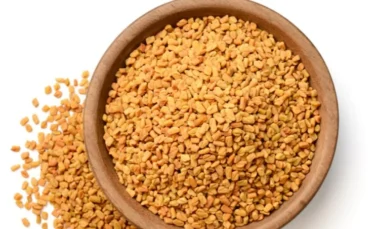
The proposed mechanism by which it may work is the fact that the various plant compounds in fenugreek may interact with a chemical in the body known as dihydrotestosterone (DHT). If DHT attaches itself to your hair follicles, the result, sooner or later, would be hair loss. Fenugreek may slow down the ability of DHT to attach to your hair follicles9.
A small study13 involving 53 people found that a 300 mg daily oral dose of fenugreek seed extract over six months led to improvements in hair volume and thickness for more than 80% of the participants compared to those given a placebo.

Fenugreek seeds contain hormone-regulating compounds that may help in reducing hair loss caused by hormonal imbalances. Additionally, the seeds have antimicrobial properties that may help protect the scalp from infections, reducing the risk of hair loss due to scalp conditions.

Fenugreek seeds possess conditioning properties that help in reducing dryness and frizz. Regular use of fenugreek seeds as a hair mask or rinse may make your hair soft, smooth, and manageable. They also provide hydration to the scalp, reducing flakiness and itching.

The antifungal and antibacterial properties of fenugreek seeds may be responsible for anti-dandruff effects4. Regular application of fenugreek seed paste or oil may help reduce scalp inflammation, itching, and flaking associated with dandruff5.
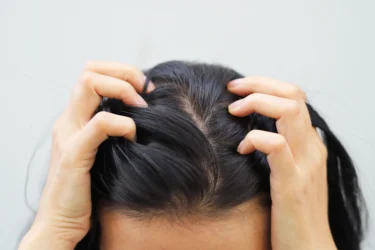
Fenugreek’s anti-inflammatory properties may help reduce scalp inflammation and alleviate itchy, red, or irritated skin1. This may aid in improving overall scalp health and promote healthy hair growth.
There are medical conditions also that may affect your hair and scalp, causing scalp issues and hair loss. If you are unsure, it is best to consult a dermatologist before initiating any home remedy.
For most people, fenugreek seeds are safe. However, in my opinion, one should avoid them before the 37th week of pregnancy as they may cause early labour. If you have a peanut or chickpea allergy, you are advised to stay away from fenugreek12.
Dr. Siddharth Gupta, B.A.M.S, M.D (Ayu)
Fenugreek can be incorporated into your hair care routine in multiple ways, which are described below.
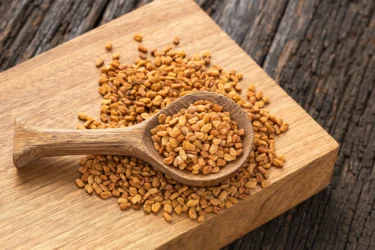
You can use raw fenugreek seeds as a natural hair mask or hair oil. Simply grind the seeds, create a paste, and apply it to your hair and scalp. Leave the paste on for a few minutes before rinsing it off.
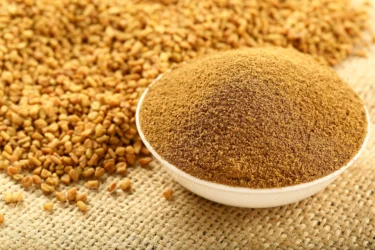
Fenugreek powder can be used as a hair mask or mixed with other ingredients, such as yogurt, honey, or oils, to create a nourishing paste. Apply the paste to your scalp and hair, focusing on the roots, and leave it on for about 30 minutes before rinsing thoroughly with lukewarm water.
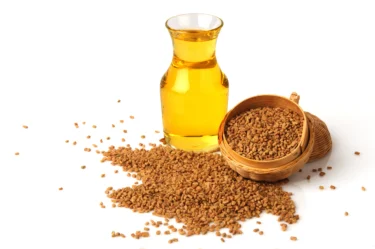
You can make your own fenugreek oil by heating fenugreek seeds with a carrier oil, such as coconut or olive oil. Let the seeds infuse the oil for a few minutes, then strain the oil and store it in a clean container. Massage the fenugreek seed oil onto your scalp and hair, leave it on for an hour or overnight, and shampoo as usual.
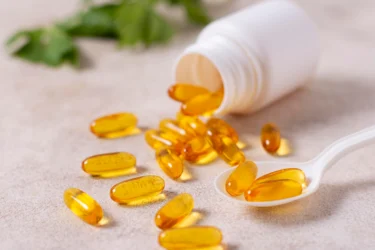
Fenugreek supplements are available in the form of capsules, powders, and extracts, making it easy to incorporate this natural remedy into your daily routine. Consult with your healthcare provider before starting fenugreek supplementation, as it may interact with certain medications.

Fenugreek can be applied topically to your hair and scalp in the form of hair masks, hair rinses, shampoos, and conditioners11.
Fenugreek can be consumed in various forms to incorporate its benefits internally, which are described below.
While fenugreek is generally considered safe for most individuals, there are some possible side effects and risks associated with its use, which are as follows.
Overconsumption of fenugreek may cause the following:
Moderate your fenugreek intake and monitor your body’s reaction to ensure a safe experience.
Like any other herb, people allergic to legumes, peanuts, chickpeas, or related plants might be sensitive to fenugreek, causing inflammation, itchiness, or redness on the skin. If you notice any unusual reactions after consuming or applying fenugreek, discontinue its use and consult your healthcare provider.
Fenugreek might interfere with certain medications, including those used to control diabetes, blood clotting, thyroid disorders, and high cholesterol levels2. Consult with your doctor before taking fenugreek orally if you are on any medication.
When consuming fenugreek, it is crucial to adhere to the recommended dosages. A high dose of fenugreek may cause a sudden drop in blood sugar and may have hepatotoxic effects. Pregnant women should avoid fenugreek supplementation, as it may increase the risk of birth defects.
A holistic approach to hair growth addresses not only the application of topical remedies and supplements for hair health but also considers various factors that can influence hair growth.

Consume a balanced diet rich in hair-friendly nutrients, such as protein, iron, zinc, vitamins, and healthy fats. Ensure that you are getting enough essential amino acids, vitamins, and minerals through your diet to support optimal hair growth6. Focus on a variety of whole foods, such as green leafy vegetables, lean protein sources, dairy products, and healthy fats.

Stress is known to affect hair growth negatively. Try incorporating stress management techniques such as breathwork, meditation, yoga, or exercise into your daily routine to help reduce stress and support better hair health7.

Certain lifestyle choices, such as smoking, excessive alcohol consumption, and poor sleep hygiene, can adversely impact hair health. Make a conscious effort to adopt healthier habits and prioritize restorative sleep to support your hair growth journey.

Choose hair care products suited for your hair type and avoid harsh chemicals, sulfates, parabens, and silicones. Adopt a gentle haircare routine, including regular scalp massages to stimulate blood circulation and promote hair growth.

Genetic factors play a significant role in hair loss and hair growth patterns. If you suspect a hereditary pattern of hair loss, consult your healthcare provider to discuss suitable options.
Fenugreek seeds offer remarkable benefits in hair growth and hair health, supported by scientific research and traditional practices. Incorporating fenugreek seeds into your hair care routine may help reduce hair loss, stimulate hair growth, address dandruff, scalp inflammation, and reviving damaged hair.
While using fenugreek may be beneficial, it’s essential to consider possible side effects, allergies, and medication interactions. Utilizing a holistic approach that encompasses proper nutrition, stress management, lifestyle modifications, and appropriate hair care products is crucial for promoting healthy hair growth.
It is not necessary to use fenugreek on your hair every day. Applying it 2-3 times a week as part of a hair mask or oil massage may provide sufficient benefits. Daily use may risk increasing Pitta dosha levels on your scalp.
There is no specific recommended amount of fenugreek for hair growth, as it may vary based on individual experiences and conditions. However, some studies suggest that a daily oral dose of 300 mg of fenugreek seed extract may significantly improve hair growth and thickness. Always consult your doctor before deciding to consume fenugreek.
Typically, you can leave a fenugreek mask on your hair for about 30-45 minutes before rinsing it off with warm water. If you have severely dry hair and dandruff issues, you may leave the mask overnight and wash it off the next morning.
Apart from providing essential nutrients for hair growth, fenugreek water is said to help flush out toxins from your body, improving digestion and bowel movement. As a result, fenugreek contributes to maintaining the harmony of your Ayurvedic doshas in the body, which in turn, is said to promote voluminous hair growth and avoid dryness and dandruff issues5.
Studies suggest that significant improvements in hair growth can be observed after using fenugreek consistently for 3-4 months. However, the duration to achieve desired results may vary among individuals, depending on their unique hair needs and conditions. You may try fenugreek, after using it if you feel there isn’t much improvement then there may be some other reason for hair loss, and it is better to consult a dermatologist. Also, if you want to consume fenugreek then before doing so always discuss it with your doctor first.
Disclaimer: The information provided here is for educational/awareness purposes only and is not intended to be a substitute for medical treatment by a healthcare professional and should not be relied upon to diagnose or treat any medical condition. The reader should consult a registered medical practitioner to determine the appropriateness of the information and before consuming any medication. PharmEasy does not provide any guarantee or warranty (express or implied) regarding the accuracy, adequacy, completeness, legality, reliability or usefulness of the information; and disclaims any liability arising thereof.
Links and product recommendations in the information provided here are advertisements of third-party products available on the website. PharmEasy does not make any representation on the accuracy or suitability of such products/services. Advertisements do not influence the editorial decisions or content. The information in this blog is subject to change without notice. The authors and administrators reserve the right to modify, add, or remove content without notification. It is your responsibility to review this disclaimer regularly for any changes.
White hair is a normal part of the ageing process, primarily caused by a gradual loss of melanin, the pigment responsible for hair colour. However, some individuals may experience white hair at an earlier age due to factors beyond ageing, including genetics, stress, and certain health conditions. In this article, we will examine the possible reasons for premature greying and explore measures that may help slow or partially reverse this process. Understanding the underlying causes empowers you to manage early white hair more effectively. Finally, we will address some frequently asked questions on the subject1.
Below, we will explore the factors that can contribute to the early onset of white hair.
A family history of early white hair, such as that of your parents or grandparents, may indicate a genetic predisposition. The way these genes influence your body determines when the pigment-producing cells in your hair begin to decline, leading to the appearance of white hair1.
Stress is a common aspect of modern life and may have an impact on hair health. It is believed that stress can affect the pigment-producing cells in hair follicles, potentially contributing to premature greying2.
Autoimmune conditions arise when the immune system mistakenly attacks healthy cells. In coditions such as alopecia and vitiligo, the immune response can affect the pigment-producing cells in hair follicles. Managing these autoimmune conditions may help limit further loss of hair colour and, in some cases, support partial restoration2.
Hormonal changes from thyroid conditions like hyperthyroidism or hypothyroidism could also trigger premature greying of hair. The thyroid gland regulates various bodily functions, including those affecting hair pigmentation. When thyroid function is disrupted, melanin production may decrease, potentially leading to a loss of hair colour2,3.
A deficiency of vitamin B12 may contribute to premature greying of hair. This essential vitamin supports the production of healthy red blood cells, which deliver oxygen to body cells, including those in the hair follicles. Insufficient levels of vitamin B12 can impair the health of hair cells, potentially disrupting melanin production and leading to early whitening4.
Smoking tobacco has been associated with premature greying of hair, with research indicating a link between smoking and greying before the age of 30. In addition to its well-known risks for serious health conditions such as lung cancer and heart disease, long-term tobacco use may contribute to the early onset of white hair1.
If you feel you have started to get white hair before its time, always consult a healthcare professional to rule out the presence of any medical condition that may be causing it.
The science behind white hair involves multiple factors, with melanin production and hair follicle function playing central roles.
Melanin is a pigment made by special cells called melanocytes. It gives colour to our skin, hair, eyes, and also protects our skin from harmful UV rays.
We have two types of melanin, namely, eumelanin and pheomelanin. Eumelanin is responsible dark hair colours while pheomelanin gives a red or yellow tint. Your unique hair colour is determined by the balance of these pigments2.
Melanocytes, the cells responsible for producing pigment, reside within the hair follicles where hair growth occurs. These cells generate melanin, which is incorporated into the growing hair fibre to give it colour. Over time, melanocytes gradually become less active, resulting in a reduction of melanin production and subsequent loss of hair colour.
Hair colour is influenced not only by age and genetics but also by several other factors that are described below.
The chemicals used in hair dyes and products can harm your hair. This can result in loss of colour and white hair. Switching to natural, gentle alternatives may help retain your hair colour2.
Oxidative stress leads to premature white hair. It occurs when there is an imbalance between free radicals and the body’s natural antioxidant defences, potentially leading to damage of hair follicles and a reduction in pigment production. While it cannot guarantee the prevention of greying, adopting a lifestyle that supports overall health, such as consuming antioxidant-rich foods, managing stress levels, and avoiding smoking may help reduce oxidative stress and support the natural condition of the hair2.
Sun rays and pollution can harm your hair and lead to early greying. The key to protecting your hair is to limit sun exposure and include more antioxidants in your diet and hair care routine.
While complete reversal is not generally possible, in certain cases it may be slowed or, to a limited extent, partially reversed, particularly if it is linked to underlying factors such as nutritional deficiencies or stress. Below are some approaches that may help slow the progression of greying or reduce its risk. These should be considered as part of a broader strategy for supporting overall hair health.
Make sure you get enough vitamins and minerals to nourish your hair. Key nutrients to focus on include B vitamins, copper, and antioxidants2.
Natural remedies may help. Using these along with a healthy diet and strong hair care habits may help keep your hair colourful.
While these are a common folk remedy, scientific evidence supporting its effectiveness is limited, and individual results may vary.
Changing your lifestyle in simple ways may boost hair health and colour. To slow down early white hair, focus on stress management, give up smoking, eat a balanced diet, and practice good hair care habits.
A hair care routine may keep your hair healthy and colourful. Using gentle, high-quality hair products may help preserve its natural texture and colour. Additionally, protecting your hair from environmental stressors such as ultraviolet (UV) rays and pollution is important in preventing premature damage1.
Ad* You May Also Explore: Pharmeasy Biotin Tablets
In some cases, medical help may be required for early signs of greying. Based on your specific needs, your healthcare provider may suggest management options.
Hair dyes and colouring can hide white hair and give the desired hair colour. Choose hair dyes that are soft on your hair and contain nurturing ingredients to keep it healthy and vivid.
Also Read: What Causes Fingernails to Split Down the Middle?
For a more long-lasting solution, you might consider professional hair care like scalp micropigmentation or hair transplantation7.
Also Read: Does Masturbation Cause Weight Loss? Debunking Sexual Health Misconceptions
White hair at an early age can be unsettling. However, understanding the underlying causes and exploring available management strategies may help you take a proactive approach to maintaining your hair’s health and appearance. From addressing nutritional deficiencies and making lifestyle adjustments to trying natural remedies or seeking professional advice, various options may support hair vitality. Ultimately, caring for your hair both internally and externally is key to promoting its overall well-being.
Also Read: How To Increase Melanin In Hair Naturally
White hair at an early age can be caused by genes, stress, autoimmune diseases, thyroid disorders, vitamin deficiencies, and damage from UV rays and pollution.
Yes, stress is linked to early white hair since it negatively affects hair follicles’ pigment cells, leading to less melanin.
The average, the onset of greying hair follows a general pattern: by the age of 50, approximately half of the population will have developed some degree of grey or white hair.
In certain cases, if the underlying cause of hair greying is identified and properly addressed—such as a vitamin deficiency or an autoimmune condition, there may be a possibility of some natural pigment returning to the hair. However, if greying is primarily due to genetic factors or the natural ageing process, it is generally considered irreversible.
Yes, white hair is often genetic. It occurs when melanocytes in hair follicles produce less melanin and this reduction is typically inherited through genes.
White hair is generally not reversible through natural means, as it results from a decrease in melanin production. Some treatments may temporarily cover or colour the hair, but they don’t restore the natural pigment.
Yes, white hair is a natural part of aging. It occurs when the production of melanin, the pigment responsible for hair colour, decreases or stops, leading to the loss of colour.
Yes, it is possible to be born with white hair, though it is rare. This condition can be due to genetic factors or albinism, which affects melanin production from birth.
Dandruff itself does not cause white hair. However, persistent dandruff can lead to scalp irritation and inflammation, which might affect hair health, but it does not directly change hair colour to white.
You can pluck white hair, but it’s not recommended as a long-term solution. Plucking can damage the hair follicle and lead to potential issues with hair regrowth.
Disclaimer: The information provided here is for educational/awareness purposes only and is not intended to be a substitute for medical treatment by a healthcare professional and should not be relied upon to diagnose or treat any medical condition. The reader should consult a registered medical practitioner to determine the appropriateness of the information and before consuming any medication. PharmEasy does not provide any guarantee or warranty (express or implied) regarding the accuracy, adequacy, completeness, legality, reliability or usefulness of the information; and disclaims any liability arising thereof.
Beautiful, glowing skin not only boosts our confidence but also reflects good overall health. However, achieving a radiant complexion takes effort, care, and consistency. This article will explore research-backed strategies that may help you maintain healthy, glowing skin. From the basics of a daily skincare routine to the importance of using sun protection, we’ll explore essential tips and habits that cater to different skin types.
We will provide you with actionable advice on how to potentially achieve and maintain healthy, glowing skin, discussing the role of nutrition, stress management, and skincare regimens. Lastly, we will answer some frequently asked questions regarding the same.
Before diving into specific tips for achieving healthy skin, it’s essential to understand the importance of a consistent skincare routine and identify your unique skin type. These two factors will set the foundation for choosing the right products and practices tailored to your skin’s specific requirements.
A consistent and well-rounded skincare routine is crucial for keeping your skin clean, clear, and protected. The three fundamental steps in a daily skincare routine are cleansing, toning, and moisturising.
Remember, a well-balanced skincare routine may help promote healthy skin function and combat common skin issues like acne, dryness, and signs of ageing.
Understanding your skin type is vital for selecting appropriate skincare products tailored to your skin’s specific requirements. There are five primary skin types:
Knowing your skin type allows you to customise your skincare routine to address specific concerns and maintain a healthy, balanced complexion.
Now that we’ve covered the basics, it’s time to delve into more targeted tips and strategies for maintaining a healthy skin. These are described below.

Protecting your skin from the harm caused by the sun is very important3.Too much sun can lead to early ageing, sunburn, and even skin cancer.

Smoking has a detrimental effect on skin health, causing premature ageing, wrinkles, and an increased risk of skin cancer.

Establishing a consistent and suitable skincare routine tailored to your skin type is instrumental in promoting healthy skin.

A well-balanced, nutrient-rich diet plays a significant role in maintaining healthy skin. Proper hydration and a diet rich in antioxidants, proteins, and healthy fats may improve skin quality and appearance.

Stress has a significant impact on skin health, exacerbating existing skin conditions and causing skin sensitivity and breakouts9. Increased stress levels can trigger hormone imbalances, leading to increased oil production, inflammation, and impaired skin barrier function. Below, we have described ways in which you may try to reduce stress.
Relaxation techniques
Incorporate stress reduction techniques into your daily routine, such as meditation, mindfulness, yoga, or deep breathing exercises.
Also Read: Amazing Benefits of Moringa for Your Skin!
Now that you’re equipped with essential skin health strategies, let’s explore some advanced skincare tips that may help you truly optimise your skin’s appearance and health.
Once you’ve identified your skin type from the five primary skin types mentioned earlier, you can customise your skincare routine. Choose products specifically formulated for your skin’s unique requirements. This may include targeted management options, specific moisturisers, or serums catering to your skin’s concerns.
Considering the vast array of skincare products available, it’s essential to know which ingredients are most beneficial for your skin type and concerns.
In addition to your skincare routine, adopt healthy lifestyle habits that possibly promote optimal skin health.
Also Read: 8 Beauty Benefits of Using Ice Cubes On The Skin
Everyone’s skin is unique, and special skin requirements may arise depending on factors such as age, skin condition, and even personal preferences. Here are some helpful tips to address these specific concerns.
With age comes the challenge of combating fine lines, wrinkles, and the loss of firmness. Use products containing ingredients like retinol and vitamin C that are said to boost collagen production and reduce the appearance of wrinkles12. Also, ensure consistent sun protection.
For individuals who frequently experience acne breakouts, choose non-comedogenic products (products that do not block pores). Use targeted therapy, such as salicylic acid or benzoyl peroxide, to combat acne-causing bacteria13.
Those with sensitive skin should opt for gentle, fragrance-free products that do not cause irritation or redness. Stick with a minimalistic skincare routine and do a patch test for new products before using them.
Darker skin tones can be more prone to hyperpigmentation and require a diligent sun protection routine. Choose broad-spectrum sunscreen with SPF 30 or higher, along with skincare products that help address uneven skin tone or dark spots.
Lighter skin tones are often more sensitive to sun exposure and prone to sunburn. Prioritise maintaining an effective sun protection routine with broad-spectrum sunscreen with SPF 30+ and minimise sun exposure during peak hours.
Also Read: Natural Home Remedies for Oily Skin
Achieving and maintaining healthy, glowing skin requires diligence, care, and consistency. By understanding the fundamental principles of skincare, knowing your skin type, and implementing a personalised skincare routine, you may improve your complexion and maintain its health for years to come.
Additionally, don’t underestimate the importance of a balanced diet, proper hydration, adequate sleep, stress management, and regular exercise as a part of a healthy lifestyle. When combined with your daily skincare regimen, these habits can help you achieve healthy and radiant skin.
Also Read: Natural Home Remedies for Hyperpigmentation
By consistently performing a gentle skincare routine, protecting your skin from the sun, maintaining a balanced diet, and practicing healthy lifestyle habits like exercise and proper sleep, you may achieve a healthy, glowing complexion.
To make your skin look healthier, be gentle when cleansing your skin, exfoliate once or twice a week, moisturise daily, and always apply sun protection when exposed to sunlight.
hile “perfect” skin may remain an unattainable standard, natural approaches to maintaining healthy skin include consuming nutrient-dense fruits and vegetables, staying hydrated, getting sufficient sleep, managing stress, exercising regularly, and practicing sun-safe habits.
To keep moisture in your skin, drink plenty of water, use lukewarm water while washing and bathing, apply a moisturiser suitable for your skin type, and utilise a humidifier to maintain indoor air humidity levels.
Yes, UV rays can penetrate the clouds, so using sunscreen daily is essential for preventing skin damage.
Disclaimer: The information provided here is for educational/awareness purposes only and is not intended to be a substitute for medical treatment by a healthcare professional and should not be relied upon to diagnose or treat any medical condition. The reader should consult a registered medical practitioner to determine the appropriateness of the information and before consuming any medication. PharmEasy does not provide any guarantee or warranty (express or implied) regarding the accuracy, adequacy, completeness, legality, reliability or usefulness of the information; and disclaims any liability arising thereof.
Links and product recommendations in the information provided here are advertisements of third-party products available on the website. PharmEasy does not make any representation on the accuracy or suitability of such products/services. Advertisements do not influence the editorial decisions or content. The information in this blog is subject to change without notice. The authors and administrators reserve the right to modify, add, or remove content without notification. It is your responsibility to review this disclaimer regularly for any changes.
Millions across the globe suffer from diabetes. This health issue calls for a life change, mainly in the diet. A large proprotion of packaged drinks available in the market are either full of sugar or contain artificial sweeteners which may be harmful for health. The hunt for natural drink swaps aiding blood sugar control is thus continual and coconut water seems to be a standout1.
This blog aims to shed light on the potential health benefits of coconut water and its role in diabetes. We will dive into its nutrient profile, its effect on blood sugar, and how to safely add it to your diet.
Coconut water is a health-packed drink from the core of young, green coconuts. This section explains what makes it special, its nutrient content, and why it’s good for you11.
A cup (240 ml) of raw coconut water gives you:
Sweetened versions have more sugar. So, plain coconut water is a better pick1.
Our bodies need vital minerals called electrolytes. They keep our body fluids balanced. Coconut water is rich in them, providing a good part of your daily needs in just one cup8.
Coconut water can help you manage weight while staying hydrated. Plus, it adds a sweet twist to your water intake1.
Nature has packed coconut water with antioxidants. These substances fight harmful free radicals, which makes it a good choice to drink4.
Diabetes is a condition that leads to high blood sugar levels in the blood due to insulin-related issues. There are two key types of the disease:
Signs of diabetes can be unquenchable thirst, passing urine often, sudden weight loss, tiredness, and blurry vision. Managing health and lifestyle changes are key in handling diabetes.
We’ll explore in this section how does coconut water falls into diabetes control, looking at how it can be a good addition to a diabetes-friendly meal plan10.
Consumed wisely, coconut water is said to be helpful for diabetics. This section dives into some likely plus points.
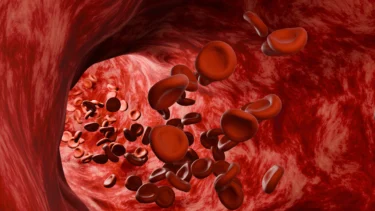
Diabetes often worsens blood flow. Having coconut water may help in widening blood vessels, helping better circulation2. But further research is needed to prove this.

Coconut water makes weight management easier. It’s a low-calorie drink packed with nutrients. This can help keep weight in check and health on track1.
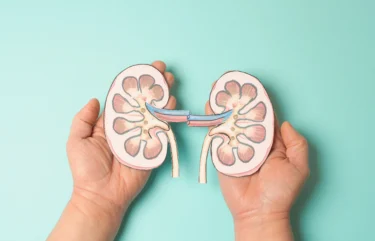
Regular coconut water consumption might be good for kidney health . Research hints that it lowers kidney damage caused by diabetes, although more long-term studies are needed to prove this3.
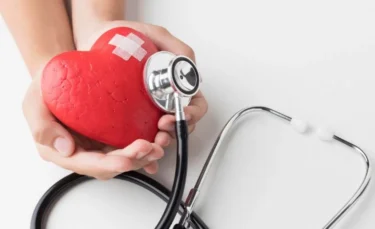
Coconut water can prove to be a heart-friendly choice. It’s rich in nutrients like potassium9 and magnesium which are good for heart5,7. More research is required to confirm this benefit.
As coconut water has natural sugars, people with diabetes might be concerned. Drawing a line between natural and added sugars can bring clarity.
The sugar found in whole foods is natural. Added sugar is what food processors add to food items and drinks. In coconut water, the sugar is natural. That’s ok if you don’t overconsume it1.
Put next to other drinks, coconut water seems much better. It boasts less carbohydrates and sugar than most sugary drinks, potentially making it a safer pick1.
While coconut water may offer perks for diabetics, they must tread carefully. Below are a few things to remember before adding it to your routine.
Also Read: 10 Best Carbohydrates To Help Manage Blood Sugar!
Knowing when and how to have coconut water can help you get the most out of it. Let’s look at some strategies:
When consumed wisely, coconut water may have potential perks for diabetics. Its nutrient-rich, low calorie, and electrolyte-packed profile makes it a worthy swap for sugary drinks. As always, talk to your doctor before you introduce anything new to diet, keep a check on blood sugar levels, and eat balanced meals for the best diabetes control.
Also Read: Diabetes: The Silent Killer Sweeping Across India
Stick to 8 ounces or less of raw coconut water daily. However, it’s advisable to discuss with your healthcare provider first if you have diabetes.
People with high potassium levels, kidney problems or those taking antibiotics should always check with a healthcare professional before having coconut water.
While raw coconut water has natural sugars, it still trumps most sugary drinks. Always choose plain and unsweetened varieties to cut down on sugar intake.
For diabetics, plain coconut water, herbal teas, and water infused with fresh fruit or cucumber slices are smart picks. But if are a diabetic, its best to discuss with your doctor before you introduce anything new to diet.
Plain, unsweetened coconut water wins over other types. Always read labels and aim for pure, natural options.
Disclaimer: The information provided here is for educational/awareness purposes only and is not intended to be a substitute for medical treatment by a healthcare professional and should not be relied upon to diagnose or treat any medical condition. The reader should consult a registered medical practitioner to determine the appropriateness of the information and before consuming any medication. PharmEasy does not provide any guarantee or warranty (express or implied) regarding the accuracy, adequacy, completeness, legality, reliability or usefulness of the information; and disclaims any liability arising thereof.
Links and product recommendations in the informationprovided here are advertisements of third-party products available on the website. PharmEasy does not make any representation on the accuracy or suitability of such products/services. Advertisements do not influence the editorial decisions or content. The information in this blog is subject to change without notice. The authors and administrators reserve the right to modify, add, or remove content without notification. It is your responsibility to review this disclaimer regularly for any changes.
Everyone walks every day. Walking to the store, walking for exercise, maybe even walking just to clear your head. We often take forward walking for granted, skipping past its many health rewards. But trying to walk backward is not much known.
In this article, we’ll unpack the science-backed gains of this unique walking style1. We will also be answering many frequently asked questions regarding this topic.
Did you know?
Retro walking isn’t your average walk in the park. Whilst it may seem odd, this little twist on walking can spice up your routine. Athletes, injury recoverees, or those bored with their workouts can try it. This technique may help sharpen memory and focus, increase muscle buildup, improve balance, burn more calories, and ease knee pain1.
One standout potential merit of retro walking is that it may help enhance mental well-being.

Your brain health may get a boost from including backward marches into your regime. Studies2 have shown that walking backward helps sharpen short-term recall.

While it needs more study, some tell us that walking backward may help soothe your stress3. It engages parts of the brain that help your mood and create a sense of calm.

Reverse walking is said to make your brain work differently. This method may unclog new paths in your brain and boost your overall cognitive state4. Your brain pathways grow as your coordination and spatial awareness are challenged. Walking backward makes you be ‘in the moment’. Because you’re alert to your movements and what’s around you, you might find workouts to be fun.
Walking backward is good for the body too in the following ways.

Retro walking may help to build muscle strength as it uses a different set of mechanics. It focuses on muscles not usually used in forward walks. It may help fix bodily imbalances5.

Reverse walking may also aid in better balance and gait by making your posture stronger. Some studies show that by improving balance it may help reduce falls6.

Reverse walking may help you burn more calories as it requires greater effort. More effort equals more energy expenditure. According to health studies7, reverse walking at 3.5 mph burns 40% more calories than brisk forward walks.

Backward marching may also improve heart and lung health. As it needs more oxygen and triggers the circulatory system more. For athletes, particularly runners, reverse walking might be useful. It stretches the hip flexors to use a full range of hip extension, strengthening the backside muscles8.
Beyond the potential mental and body benefits, backward walking has other beneficial points which are as follows.

Retro walking could help if you have knee pain. This happens due to the reduced pressure or stress on the knees. Some research9 suggests that reverse walking may enhance muscle strength in individuals with issues like runner’s knee and knee osteoarthritis.

Reverse walking may help improve the flexibility and mobility of certain joints, like hips, knees, and ankles7. By engaging different muscles and adding new challenges, backward walking may decrease muscle stiffness.

Adding backward walking to your routine can add some uniqueness to your workouts and make them more engaging. Staying alert during reverse walks can make for a much more enjoyable workout experience.
You can fit reverse walking into your routine in the following way.
Select a safe open space outdoors like a park or a quiet neighborhood.
Walking on treadmills is safer. The rails and the stable deck provide support.
Running backward may yield bigger rewards. But remember, it comes with its risks.
Not everyone should try walking backward unaided without advice.
Those with severe imbalance issues, fall risks, or medical conditions for example people suffering from vertigo, etc. hindering exercise should not try reverse walking without professional help.
To walk backward safely and effectively, here are some tips:
Also Read: Benefits of Doing the Plank Exercise Every Day
Walking backward is an exciting way to mix up your workout. It offers possible brain benefits, muscle strength gains, improved balance/flexibility, and even makes workouts more fun.
Remember to put safety first. With the right approach, you could be joining the growing league of people who enjoy this fresh, unique way of exercising.
Your goal should be to insert 10 to 20 minutes of reverse walking into your routine to enjoy its benefits. With time, you can increase intensity and distance.
Walking backward can pose risks, especially for certain people. Thus, always tread with caution and seek a healthcare provider’s advice.
While reverse walking offers unique benefits, it shouldn’t entirely replace your traditional walking or running. Instead, insert a few minutes of reverse walking into your existing workouts.
Walking backward might aid those recovering from injuries or surgeries as a rehabilitation tool. Still, always ask your healthcare provider first and heed their advice.
You can try backward walking outdoors or on a treadmill to acclimatize to the movement. Start slow, take note of these safety tips, and gradually increase your intensity and coverage as you grow comfortable.
Disclaimer: The information provided here is for educational/awareness purposes only and is not intended to be a substitute for medical treatment by a healthcare professional and should not be relied upon to diagnose or treat any medical condition. The reader should consult a registered medical practitioner to determine the appropriateness of the information and before consuming any medication. PharmEasy does not provide any guarantee or warranty (express or implied) regarding the accuracy, adequacy, completeness, legality, reliability or usefulness of the information; and disclaims any liability arising thereof.
Links and product recommendations in the information provided here are advertisements of third-party products available on the website. PharmEasy does not make any representation on the accuracy or suitability of such products/services. Advertisements do not influence the editorial decisions or content. The information in this blog is subject to change without notice. The authors and administrators reserve the right to modify, add, or remove content without notification. It is your responsibility to review this disclaimer regularly for any changes.
Creatinine is a metabolic waste product naturally produced in the body and is commonly used as an indicator of muscle function. Understanding creatinine and the factors that may lead to low levels is important for maintaining overall health1.
The body uses creatine as a source of energy, particularly within skeletal muscles2. Creatinine is the waste product formed when creatine is broken down during this process1,3.
Our skeletal muscles create creatinine after metabolising creatine phosphate. The primary function of creatinine is to be filtered out from the blood by the kidneys, after which it is excreted from the body in the urine. This process helps to maintain a consistent level of creatinine in the blood4.
Several factors influence the level of creatinine in the blood. These include, age, gender, muscle mass, and ethnic background4. The common range for adult men is 0.74 to 1.3 mg/dL and for adult women, 0.4 to 1.0 mg/dL5. These values may change from person to person, depending on the laboratory conducting the test and the individual’s body composition.
A variety of factors may contribute to low creatinine levels. These can include reduced muscle mass, liver conditions, dietary factors, certain medical conditions, and pregnancy.
Reduced skeletal muscle mass may lead to lower creatinine levels, as creatinine is a by-product of the breakdown of skeletal muscle tissue.
Liver conditions, such as liver disease or liver failure, may affect the production of creatine. This can subsequently lead to reduced creatinine levels6.
Diet can also influence creatinine levels. A diet low in protein, as well as vegetarian or vegan diets, may be associated with lower creatinine levels.
Pregnant women may experience lower creatinine levels during pregnancy. This occurs due to an increased blood flow to the kidneys and typically returns to normal after childbirth8.
Certain medical conditions may also cause low creatinine levels. These include muscular dystrophy, hyperthyroidism, and anaemia2.
Several factors may contribute to lower creatinine levels, which can cause your estimated glomerular filtration rate (eGFR) to appear higher than it truly is. These factors include following a vegetarian or vegan diet, having low muscle mass, pregnancy, a history of muscular atrophy or amputation, and severe liver cirrhosis. It is essential to consult your healthcare provider if you have any questions about interpreting your eGFR or serum creatinine results1.
Dr. Rajeev Singh, BAMS
The symptoms and signs vary depending on the underlying cause of the low creatinine level.
Symptoms of low creatinine levels can be difficult to identify and may include9:
It is essential to undergo a comprehensive medical evaluation. Discuss any symptoms you are experiencing with your healthcare provider, who will review your full medical history and arrange any necessary laboratory tests.
Studies3 suggest that since the liver produces creatine, decreased liver function may result in a decrease in the body’s production of creatinine. Overall liver functioning can be affected by liver disease and liver failure caused by various medical conditions.
Dr. Siddharth Gupta, B.A.M.S, M.D (Ayu)
Low creatinine levels can be detected through blood and urine tests, a physical examination, and a thorough review of your medical history. These assessments will be conducted by your healthcare provider.
Your healthcare provider will also review your medical history, including any chronic conditions, medication use, and family history of kidney disease. Alongside a physical examination, this helps to determine the possible causes of low creatinine levels.
Your healthcare provider may recommend blood and urine tests to assess how well your kidneys are functioning.
Your healthcare provider will recommend appropriate treatment options if a cause for your low creatinine levels is identified. Managing this condition may involve addressing underlying health issues, modifying medications, and making lifestyle adjustments.
The management of low creatinine levels depends on the underlying cause.
Modifying your daily habits may help to improve your creatinine levels.
Cigarette smoking has several negative effects on the body, including a significantly increased risk of chronic kidney disease. Research suggests that quitting smoking may help reduce the risk of kidney-related issues, which could otherwise contribute to fluctuations in creatinine levels16.
Dr. Smita Barode, B.A.M.S, M.S.
To help prevent low creatinine levels, you may consider adopting the following measures:
Ensuring a balanced diet, one that includes a variety of protein sources and an appropriate intake of calories may help support healthy creatinine levels2.
Making sure that you eat a balanced diet, including using different sources of proteins and taking in the right amount of calories, may help keep normal creatinine levels14.
Maintaining proper hydration supports kidney function, which in turn may help to keep creatinine levels within the normal range15.
Engaging in regular physical activity and exercises that support the maintenance or development of muscle mass may help in sustaining normal creatinine levels12.
Low creatinine levels can arise from various underlying causes and may pose certain health risks. The implications largely depend on the specific reason behind the decrease. Early identification of the cause significantly improves the chances of effectively managing the condition and maintaining healthy creatinine levels.
Low creatinine levels result from various factors, including reduced muscle mass, liver conditions, dietary habits, and pregnancy. Symptoms can differ depending on the underlying cause. Diagnosis typically involves blood and urine tests, along with a thorough review of the individual’s overall health. By identifying the root cause, healthcare professionals can develop personalised management plans tailored to the patient’s specific needs.
Low creatinine levels may indicate muscle loss, liver problems, poor nutrition, or increased elimination during pregnancy. Proper management begins with identifying the underlying cause.
Low creatinine levels may indicate a range of health issues, from milder concerns such as inadequate nutrition to more serious conditions like liver disease or muscle disorders. It is important to consult a healthcare provider if you have concerns about your creatinine levels.
To naturally increase creatinine levels, you may consider incorporating more protein into your diet, engaging in regular exercise to maintain or build muscle mass, and ensuring adequate hydration.
Yes, older adults, individuals with muscle disorders, those experiencing liver problems, people with inadequate nutrition, and expectant mothers may be at a higher risk of low creatinine levels.
If you notice that your creatinine levels frequently exceed the normal range, or if you experience symptoms associated with low creatinine levels, such as muscle weakness or persistent fatigue, it is important to consult a healthcare professional. They can conduct a thorough evaluation and recommend appropriate management options.
To support healthy creatinine levels, it is advisable to include protein-rich foods such as meat, fish, and dairy products in your diet, alongside maintaining proper hydration. However, it is important to consult a healthcare professional for personalised guidance and to exclude any underlying medical conditions.
Low creatinine levels can indicate potential kidney issues, muscle loss, or pregnancy. However, context is crucial as it may be normal for pregnant women. Always consult a healthcare professional for accurate interpretation.
Low creatinine levels can indicate reduced muscle mass, malnutrition, or potential kidney dysfunction. It’s essential to consult a healthcare provider for proper evaluation and diagnosis to determine the underlying cause and appropriate management.
Low creatinine levels can sometimes indicate kidney disease, particularly if accompanied by other symptoms like fatigue or swelling. However, it is essential to consult a healthcare provider for proper diagnosis and treatment.
Yes, low creatinine levels are considered normal during pregnancy due to the increase in blood volume and changes in kidney function. However, it’s essential for expecting mothers to consult their healthcare provider for proper monitoring and guidance.
Disclaimer: The information provided here is for educational/awareness purposes only and is not intended to be a substitute for medical treatment by a healthcare professional and should not be relied upon to diagnose or treat any medical condition. The reader should consult a registered medical practitioner to determine the appropriateness of the information and before consuming any medication. PharmEasy does not provide any guarantee or warranty (express or implied) regarding the accuracy, adequacy, completeness, legality, reliability or usefulness of the information; and disclaims any liability arising thereof.
Next Page »« Previous Page